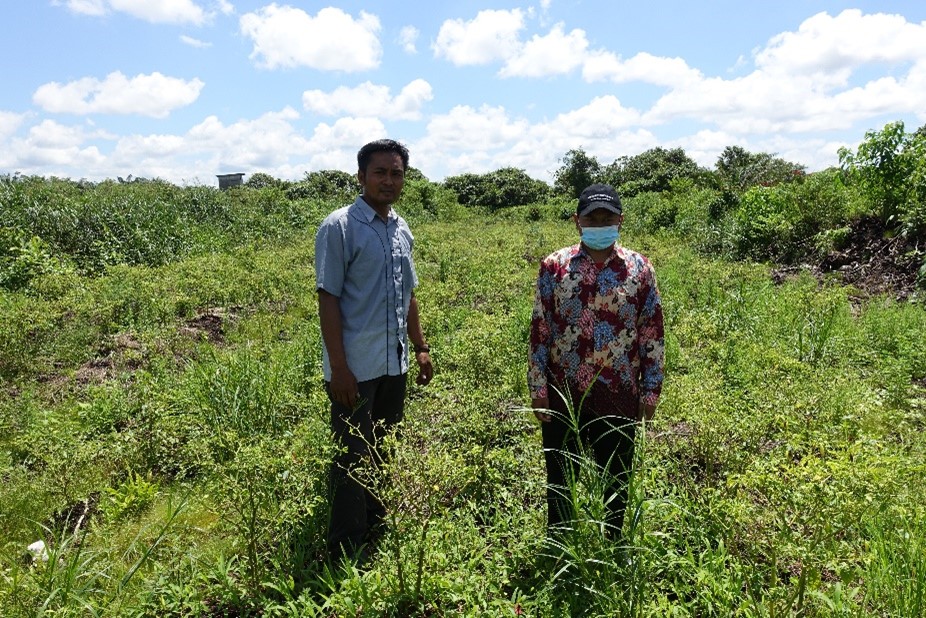Stories
Disaster-Resilient Village Suffering Due to Lack of Funds
Jul 18, 2022 by Eli Nur Nirmala SariBanner Image By : Eli Nur Nirmala Sari. The hut intended as Destana’s basecamp in Permata Village, which is currently being used as a work hut for farming
The Disaster Resilient Village (Desa Tangguh Bencana), abbreviated as Destana, in Permata Village, Buku Raya Sub-District, Kubu Raya District, West Kalimantan Province, was established in 2016. Destana is a group that was established with the objective of preventing peatland fires and extinguishing fires if peatland fires cannot be avoided.
At the time of its establishment, Destana had 30 members consisting of 10 forum members and 20 volunteers. The function of forum members is to manage the group. On the other hand, volunteers are only active when needed, e.g. when there is a peat fire. Destana in Permata Village is responsible for the entire village, covering an area of 27 hectares. At the time of its establishment in 2016, Destana members received training from the National Agency for Disaster Management (BNPB) and the Kubu Raya District Regional Agency for Disaster Management (BPBD).
A peatland fire occurred in Permata Village after the Destana was established, i.e. in 2019. The total area burned was approximately 2 hectares. However, there was not much that the Destana could do at that time due to limited equipment. “Indeed, we were assisted by PT BPG and PT WSL in extinguishing the fire. They lent me equipment to extinguish the fire. We actually received assistance in the form of water pumps and hoses from BNPB AND BPBD in 2018, but the hose was too short," said Bambang Tri Wahyudi, Chief of Mutiara Jaya Hamlet who is also a member of Destana. In Permata Village, PT Bumi Perkasa Gemilang (PT BPG) manages approximately 2,800 hectares of palm oil and PT Wana Subur Lestari (PT WSL) manages industrial plantation forests (HTI) for acacia and gelam. These two companies assisted in extinguishing a peatland fire in Permata Village in 2019.
"The fire was extinguished after about a week," continued Bambang. “We are having difficulties in obtaining funding. It is also difficult to reach the location of the fire due to the lack of road infrastructure," said Abdu Rohman, Chief of Setia Jaya Hamlet, also a member of Destana. "During a fire, poor cellphone reception also makes it difficult for us to communicate with each other," continued Rohman. The WRI Indonesia team also found it difficult to find cellphone reception in Permata Village. Cellphone reception was only available at the small pier (where our speedboat docked) in front of the Permata Village office.
According to Bambang and Rohman, BRG or the Peatland Restoration Agency has provided financial assistance amounting to Rp 129 million to build a hut in the Harapan Baru Hamlet. The hut was built as Destana's base camp. However, it has only functioned as a work hut to manage the plantation beside it. "This land is land owned by the village and was lent to Destana for farming. The harvest is expected to fund Destana's operations. However, the land is difficult to cultivate as it always floods in the rainy season,” said Rohman while pointing at the land planted with chili, ginger, and corn. "Look at this, the chili is also unhealthy and we haven’t been able to manage this. This condition would certainly result in a harvest failure.”
There were also rows of drying corn plants. Rohman said that the village owns the land cultivated by Destana, approximately 90 m x 25 m is planted with chili, and 75 m x 12.5 m is planted with ginger. On the other hand, only one row of corn is planted on the edge of the ginger plantation. "It's difficult to cultivate crops here," said Rohman, and Bambang agreed. They said that the reason for choosing this particular land was because the land belongs to the village, hence it could be borrowed for free and Destana does not need to pay rent for the land. On the other hand, Destana will suffer a loss when crops fail.
"We don't have donors to fund Destana's operations, hence it's also difficult for us to remain operational. We patrol at our own expense," said Rohman. "We have harvested chili in January 2022. We harvested chilies in a portion of land (approximately 30 m x 70 m). We harvested 83 kg and sold it for Rp 40,000 to Rp 50,000 per kg," said Rohman. “And we have harvested ginger also in a portion of land approximately 3 m x 30 m. We harvested 64 kg and sold it for Rp 6,000 per kg,” Bambang added. However, they mentioned that the harvest could not sufficiently cover Destana's operational costs, because they needed money to continue cultivating the crops. Not to mention the harvest failures that may occur. “It's difficult for Destana to remain operational without any funding!" said Rohman ending his story about Destana.
